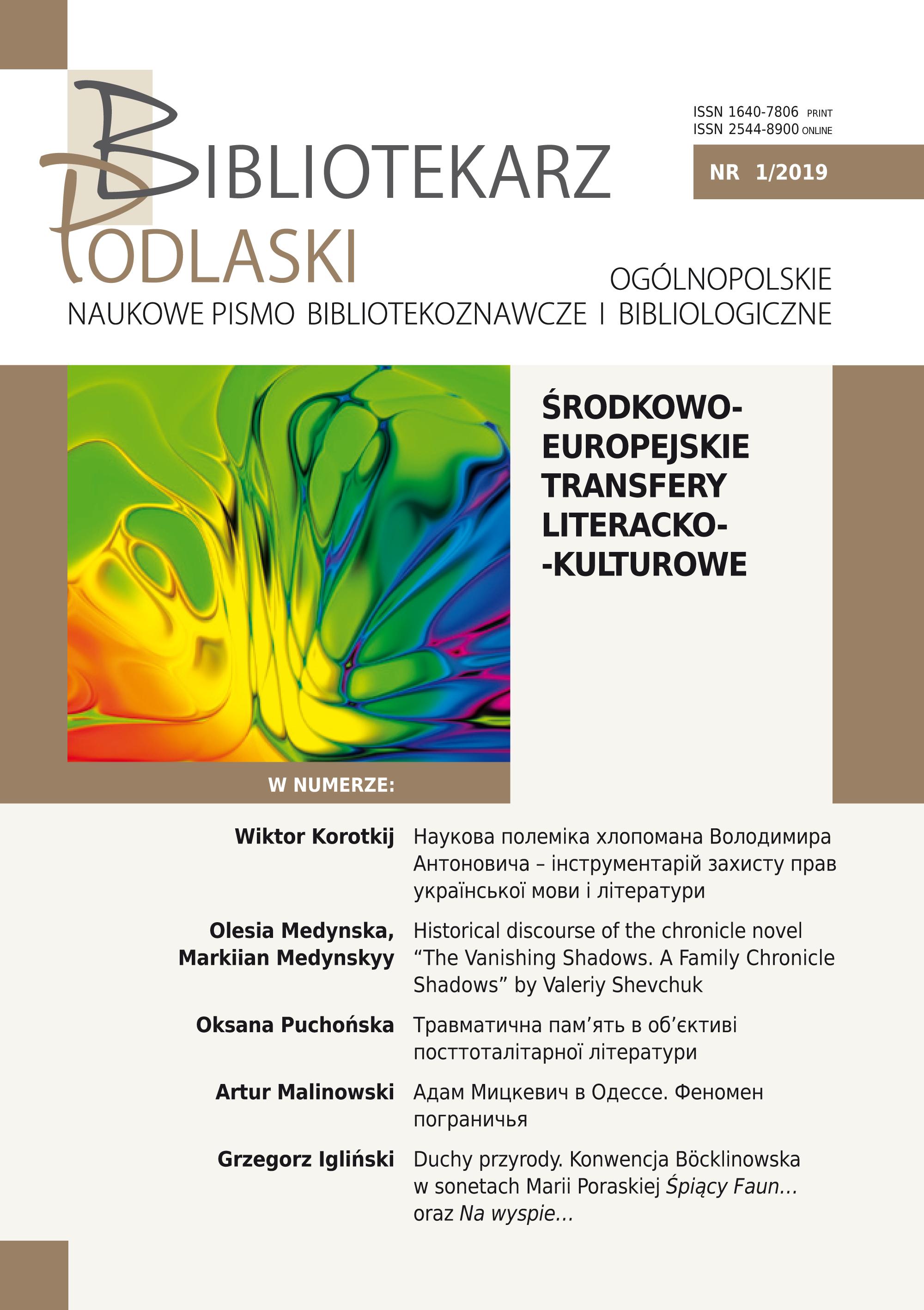Abstract
Mickiewicz stay in Odessa is a biographical milestone that leads us to the problems of the genealogy of texts, cultural frontier and the identity of a romantic poet in imperial society and an alien mental environment. The period from the end of winter to November 1825 is indicative from the point of view of the psychology of transitivity, fundamental instability and the sensation of flying, hovering above the commonplace. The situation of inter-threshold, above the position in a rather traditionalist society, of course, reflects the psycho-physiological status of the politically unreliable Polish poet. He peculiarly mimics and appears in unexpected guises of a fluttering moth, a plucked flower, devoid of roots, not tied to tradition, environment, life, home in the broad sense of the word. Separation from the soil is fundamentally different from the temporary shelter and the accompanying type of self -identification. He is a stranger in the Odessa space, baseless for him on several parameters, primarily political and national-cultural. The situation of a gap, with a tendency to subject-material figurative materialization, emotional experiences, is aggravated by the play type of behavior. He consciously emphasizes his strangeness, putting on the mask of his not-his own and consistently fulfilling his intended role.
References
Chiejzinga J., Osienʹ sriedniewiekowja. Issledowanije form żyzniennogo układa i form myszlenija w CHIV i XV wiekach Wofrancyi i Nidierłandach, Moskwa 1995. 416 ss.
Litieraturnyje i krajewiedczeskije istoczniki, miemuary, dniewniki, pisʹma 1794– 1850 godow ob Odiessie pierwoj połowiny CHICH wieka, 170 ss.
Mickiewicz A., Dumania w dzień odjazdu, [w:] Wiersze. Dzieła, t. 1, red. Z. J. Nowak, M. Prussak, Z. Stefanowska, Cz. Zgorzelski, Warszawa 1993, s. 206-208.
Mickiewicz A., Razmyszlenija w dienʹ otjezda, http://fb2.booksgid.com/content/CC/adam-mickevich-stihotvoreniya-i-poemy/1.html.
Odessa w literaturach słowiańskich, red. J. Ławski i N. Maliutina, Białystok–Odessa 2016, 1022 ss.
Piwińska M., Wolny myśliwy. Osiem prób Mickiewicza, Gdańsk 2003. Puszkin A., S. Sobr. soczin. w 10-tomach, Moskwa 1975, s. 221.
Articles published in the “gold open access” mode on the basis of a non-exclusive license agreement between the publisher and the author. Permitted use:
- the publication may be read and stored on any device,
- the publication may be cited (with obligatory reference to the author, the title of the text, as well as the full title, bibliographic address of the issue and page of the journal)
The editorial team of “Bibliotekarz Podlaski” implements an open access policy by publishing materials in the form of the so-called Gold Open Access. From volume 42 (issue 1/2019), the journal is available under the Creative Commons license (Attribution – ShareAlike: CC BY-SA).
The key declarations of the Open Access and Open Science movement, which we fully support, are available on the CEON Open Science website.
COPYRIGHT:
The editorial team of “Bibliotekarz Podlaski” implements an open access policy by publishing materials in the form of the so-called Gold Open Access. The journal is available under the Creative Commons license – Attribution – ShareAlike 4.0: International: CC BY-SA 4.0).
The key declarations of the Open Access and Open Science movement, which we fully support, are available on the CEON Open Science website.
“Bibliotekarz Podlaski” allows its readers to read, download, copy, distribute, print, search and link to the full content of articles. We enable full, immediate, unlimited (both in a territorial, temporal and technical sense) open access to all published content, in accordance with the principle that freely available research increases and accelerates the global development of science and the exchange of knowledge.
The editorial team of “Bibliotekarz Podlaski” encourages authors to place articles published in the journal in open repositories (after the review or the final version of the publisher), provided that a link to the journal’s website is provided.
The journal does not charge the authors any fees for accepting and publishing their texts.


